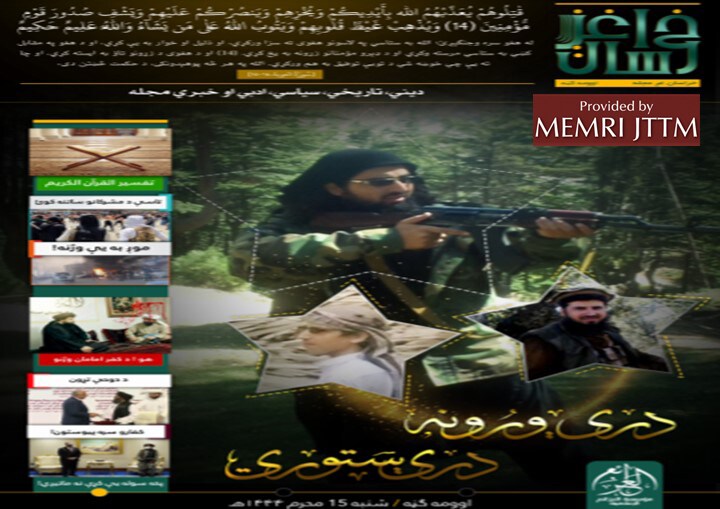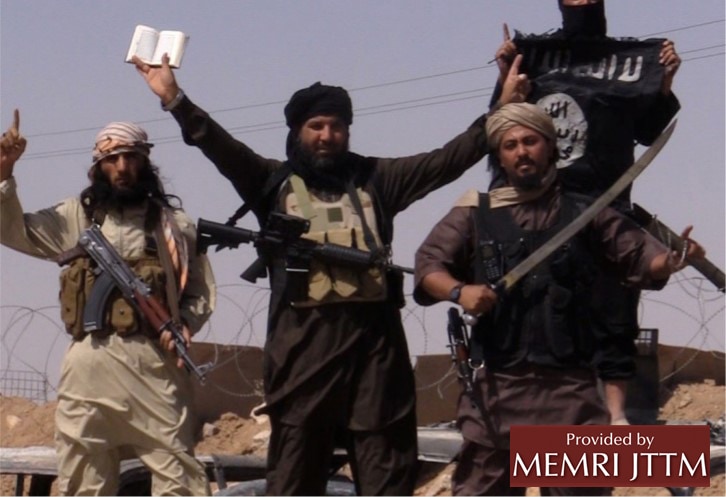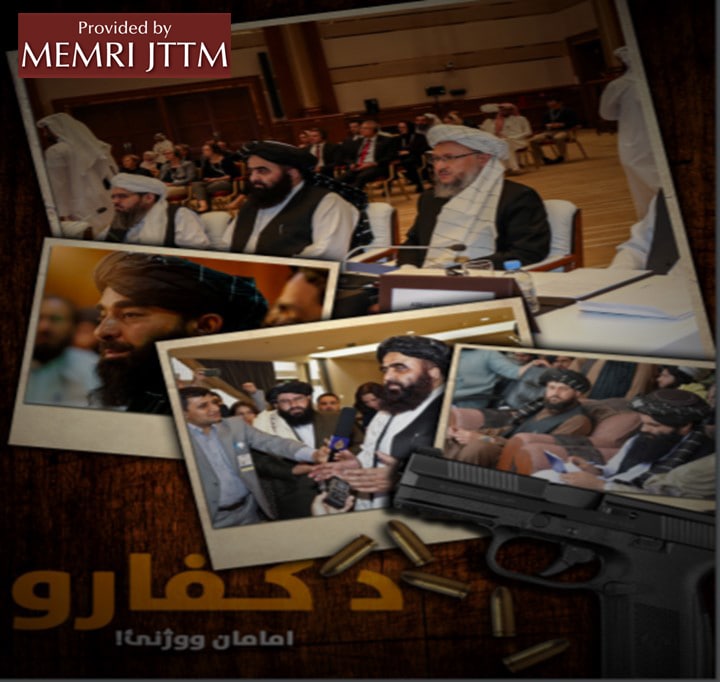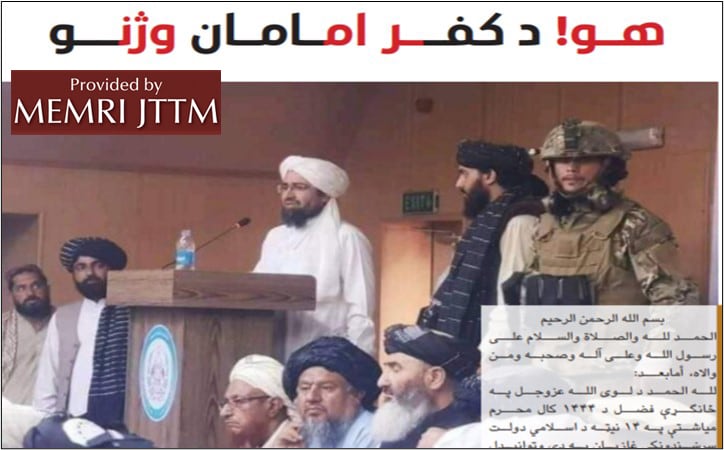The following report is now a complimentary offering from MEMRI's Jihad and Terrorism Threat Monitor (JTTM). For JTTM subscription information, click here.
An article published in Issue Seven of "Khurasan Ghag," the Pashtu-language magazine published by the Islamic State's Khurasan Province (ISIS-K), says that slain Al-Qaeda leader Ayman Al-Zawahiri had been moved from Pakistan to Kabul where he was killed in a U.S. drone strike carried out with the help of the Afghan Taliban and on the orders of the Pakistani military's Inter-Services Intelligence (ISI), which is known as the main supporter of the Islamic Emirate of Afghanistan (the ruling Taliban jihadi organization), especially its Haqqani Network.[1]
Khurasan Ghag ("Voice of Khurasan") is published by Al-Azaim Foundation, the media arm of the ISIS-K. The seventh issue of the Pashtu-language magazine has 60 pages and four sections – religious, political, literature, and history. Several articles in the magazine castigate the Doha Agreement signed between the U.S. and the Afghan Taliban in 2020.

Ayman Al-Zawahiri was killed in a U.S. drone strike at a safe house in Kabul on July 31, 2022. Amid speculation that Al-Zawahiri might have been killed after a tip from the Haqqani Network, which enjoys the patronage of the Pakistani military, Khurasan Ghag claims that the Al-Qaeda leader was killed on the ISI's orders for certain "specific targets," – a reference to Al-Zawahiri.
"In the attack that was carried out by the Taliban on the orders of the ISI, the aged Zawahiri, who was bound in allegiance to the Taliban, was killed. The same Zawahiri, who used to sit and stand on the signals of the ISI. It is possible that he may not have met the ISI's expectations anymore. That is why he was transferred to Kabul from Pakistan and eliminated there with the U.S. drone to achieve certain specific targets. The hitting of Zawahiri is a warning to all those allegiance-bound Taliban, outfits, and individuals that if they do not dance to the ISI's signals, then they will meet the same fate," says the article titled "It's a Solid Agreement, Cannot be Broken."
The "allegiance" that the article mentions is a refference the bay'a ("oath of allegiance") that Al-Zawahiri and all other Al-Qaeda commanders, including Osama bin Laden, have given to the Islamic Emirate of Afghanistan (the Taliban jihadi organization).

The magazine's political section has four articles criticizing: the Doha Agreement between the U.S. and the Afghan Taliban; Taliban officials generally; and their government's policies regarding Shi'ites.
Another article in the political section of the magazine criticizes the Doha agreement, saying that peace agreements with unbelievers in Islam is only allowed under certain conditions. The article, titled "The Doha Agreement or Solidarity With Unbelievers," says: "In the political system of Islam, peace and negotiations with unbelievers are only allowed to pave the way for achieving three strategies – Dawah, development of Islamic military and qital [fighting to kill] (jihad) or making progress in it."

The article says, in the political system of Islam, peace with the unbelievers is to be made only in an emergency and even then only temporarily. It says the main goal behind peace with the unbelievers should not be the fulfillment of personal interests. "In the structure of the political system of Islam, the overall objectives are meant to give priority to the aims of the mujahideen, the protection and achievement of the highest interests of the Islamic Ummah and the fruits of jihad. In the political system of Islam, peace is not a principle, it is not such a point if not followed then mine and yours Islam is incomplete or you and I would not reach the real goal," it says.
Rejecting the Doha Agreement which facilitated the withdrawal of U.S. and NATO forces from Afghanistan in mid-August 2021, the article says: "It is a fact that this agreement completely stands on illegal foundations and is a deal on the sacrifices of the nation."
"Our claim is that the Taliban peace is un-Islamic, rather it's an obedience to unbelievers, apostasy, and surrender. It has many differences with the peace [agreements] of the Prophet of Allah [Muhammad]," the article says.
Provoking the Taliban to attack China, Iran, and Pakistan, the article states: "O Talib, if you have made an agreement with the U.S., then go for an attack on China. You shall get war booty and will also free the Uyghur Muslims. Attack the rafidhites [pejorative term for Shi'ites] of Iran. And what about the Pakistani apostates? They had dislodged your previous government and sold your leaders nakedly to Americans. They also owe a lot to you. They are near, go and attack them."

In another article, titled "Yes, We Kill The Imams Of Unbelief," ISIS-K takes responsibility for the assassination of Sheikh Rahimullah Haaqani, a key Taliban ideologue and recruiter of suicide bombers killed in a suicide attack in Kabul on August 11, 2022.
Besides being a recruiter of suicide bombers, the prominent Taliban cleric was famous for his fiery speeches against ISIS-K. "Trained in the ISI's barn, Rahimullah Haqqani was an insect more at forefront in enmity toward believers than anyone else, and the poison he was emitting was the case of torture and killing of Muslims. The ISI had given the mission to Rahimullah to organize Emirati [i.e., Taliban] militias and ideologically train them in a way that they can see unbelief as Islam and Islam as unbelief," the article says.
The article further states that Sheikh Rahimullah was not only inciting the Taliban militias to fight the Islamic State, but also mercilessly issued fatwas for the killing of impartial monotheists. "Although Rahimullah was killed in a room of ISI training center called his office. However, Allah the almighty orders the killing of such dirty idolaters even in Haram [i.e., the Kaaba]. They will be killed in mosque and non-mosque areas, in the home and in the market. Wherever you get the chance, their killing is mandatory. These people can be killed everywhere," the article says.
[1] Twitter, August 16, 2022.
The full text of this post is available to subscribers.
Please login or register to request subscription information from MEMRI









